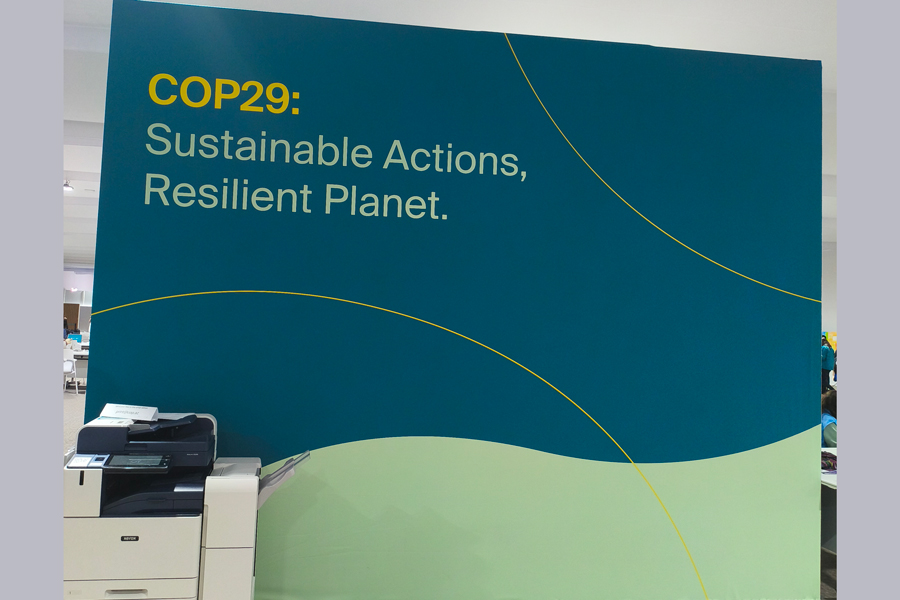Global community endorses green digital declaration for e-waste management
Climate activists demand $1.5 trillion for climate finance goal up to 2030

Yasir Wardad from Baku, Azerbaijan
Published :
Updated :

The global community on Saturday endorsed the role of digital technologies in addressing climate change, with the launch of Digitalisation Day at COP29 on Saturday.
The inaugural event, attended by over 90 governments and 1,000 stakeholders from the digital tech community, endorsed the COP29 Green Digital Declaration.
This declaration calls for boosting digital tools to reduce greenhouse gas emissions, improve energy efficiency, and enhance climate resilience, with a focus on accessibility, particularly in developing countries.
COP29 President Mukhtar Babayev emphasised that digital technologies are crucial for climate action.
He pointed to innovations such as artificial intelligence for climate modelling and the optimisation of renewable energy systems as powerful tools for accelerating sustainable solutions.
"This inaugural Digitalisation Day at COP29 embeds digital technology as a key tool in tackling the climate crisis," Babayev said.
However, the environmental footprint of digital technologies remains a concern. The rapid expansion of the digital sector—particularly data centres, electronic devices, and ICT infrastructure—has led to increased e-waste and energy consumption.
Doreen Bogdan-Martin, Secretary-General of the International Telecommunication Union (ITU), emphasised that the ICT sector must take responsibility for its environmental impact as demand for digital technologies grows.
The Green Digital Declaration aims to reduce emissions within the ICT sector, improve energy efficiency, and ensure that digital technologies are accessible to all, especially in developing countries.
The declaration also focuses on reducing the environmental footprint of digital infrastructure, tackling e-waste, and promoting digital inclusion.
A high-level roundtable discussion titled “Digital Action Path for a Green World” brought together policymakers and private sector leaders to explore how digital technologies can accelerate climate solutions while minimising their environmental impact.
Meanwhile, a demand for US $1.5 trillion in climate finance for the 2025-2030 period was also raised following the growing concerns about the environmental impact due to climate change.
Many climate advocates voiced strong demands for US $1.5 trillion in climate finance to support developing nations, especially Least Developed Countries (LDCs) and Small Island Developing States (SIDS).
During the dialogue titled “From Millions to Trillions: The Transformations Needed to Finance Climate Justice,” representatives from global organisations called for clear, binding commitments from developed countries.
The event was moderated by Katja Voigt of the Rosa Luxemburg Stiftung, with key contributions from Lidy Nacpil (Asia Pacific Movement on Debt & Development), Ezequiel Steuermann (Network for Economic, Social and Cultural Rights), Patricia Wattiena (ESCR-Net), and Aminul Hoque from COAST Foundation.
Aminul Hoque said that climate finance is not a matter of development but survival, particularly for vulnerable countries already facing severe climate impacts.
He warned that shifting the financial burden to LDCs would be unjust.
Hoque and other advocates emphasised the need for a clearly defined, binding climate finance framework, calling for financial commitments that are new, additional, and concessional.
Lidy Nacpil said that $1.48 trillion is needed by 2030 to meet the financial requirements for Nationally Determined Contributions (NDCs) of developing countries.
She argued that the New Collective Quantified Goal (NCQG) must be aligned with the needs of these nations and must include tailored provisions for SIDS and LDCs.
Patricia Wattiena and Ezequiel Steuermann also stressed the importance of excluding non-concessional loans and export credits from the definition of climate finance.
They warned that such financial instruments do not contribute to meaningful climate action, and urged developed countries to honour their obligations under the Paris Agreement’s Article 9.


 For all latest news, follow The Financial Express Google News channel.
For all latest news, follow The Financial Express Google News channel.